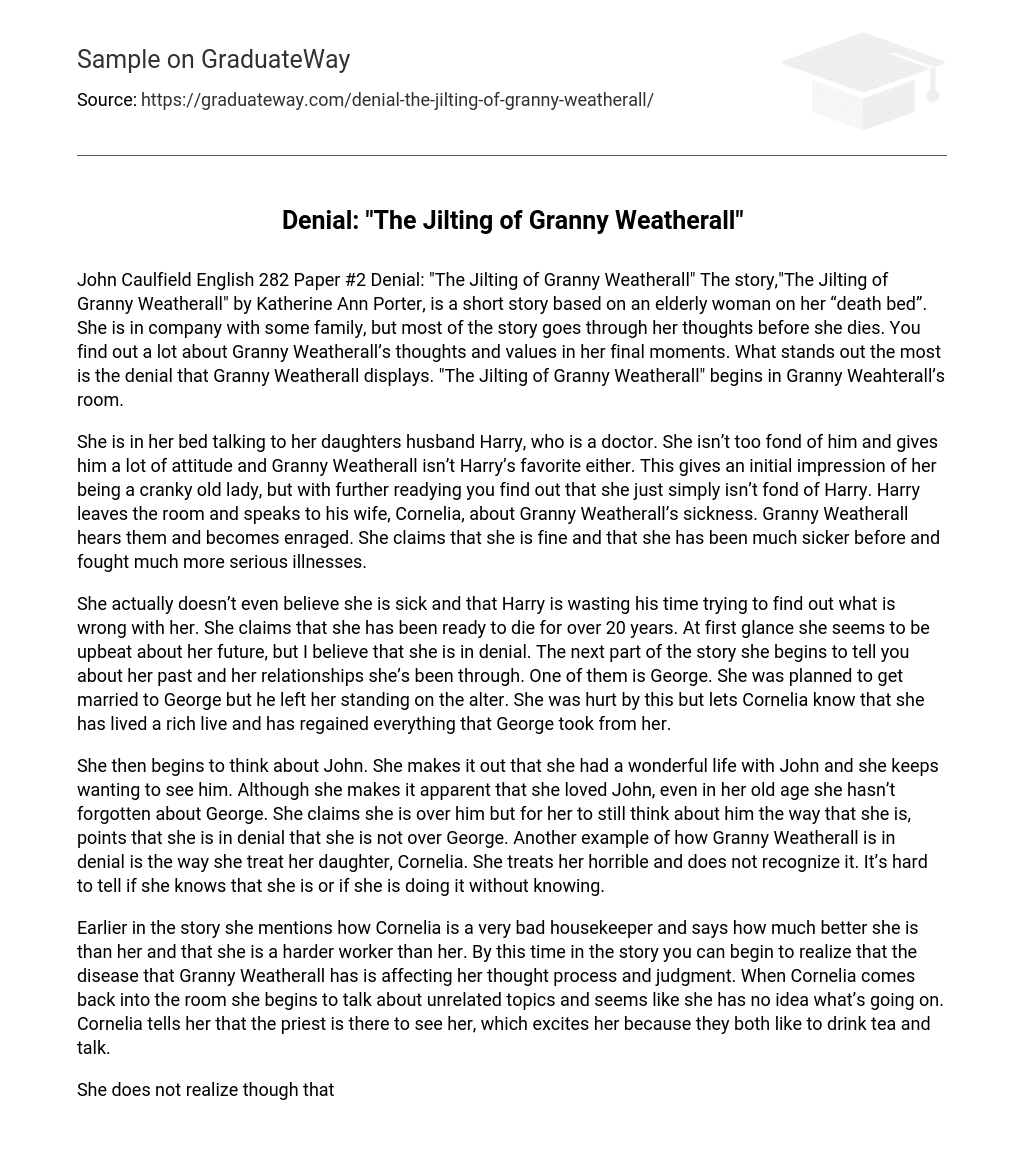The Jilting of Granny Weatherall by Katherine Ann Porter is a short story focusing on an elderly woman on her “death bed”. Although surrounded by some family, the majority of the narrative delves into her thoughts before she passes away. In her final moments, Granny Weatherall reveals much about her thoughts and values. Notably, she displays a strong sense of denial. The story commences in Granny Weatherall’s room.
In her bed, Granny Weatherall converses with Harry, her daughter’s husband and a doctor. Relations between Granny Weatherall and Harry are strained, as she is not particularly fond of him and often gives him a frosty reception. Likewise, Harry does not hold Granny Weatherall in high regard. At first glance, Granny Weatherall may appear to be a grumpy elderly woman; however, further reading reveals that her disapproving attitude is reserved specifically for Harry. After Harry exits the room, he discusses Granny Weatherall’s illness with his wife, Cornelia. Overhearing their conversation, Granny Weatherall becomes furious. She asserts that she is perfectly fine and has previously endured more severe diseases with great determination.
Despite Harry’s attempts to investigate the cause of her illness, she adamantly denies being sick, claiming that she has been prepared for death for more than two decades. Despite initially having a hopeful outlook on what lies ahead, I believe she is rejecting the truth. Later in the story, she discloses information about her history and previous romantic involvements, including George’s failed marriage proposal. While being abandoned by George on their wedding day caused tremendous anguish, she reassures Cornelia that her life has had meaning and that she has recovered everything he stole from her.
Reflecting on the beautiful life she once shared with John, she ponders and yearns for their reunion, revealing her enduring affection for him. Nonetheless, even in her advanced age, Granny Weatherall has not completely let go of George. Although she proclaims to have conquered her love for him, the fact that thoughts of him persist implies her resistance to acknowledging any lingering emotions. Furthermore, Granny Weatherall’s treatment of Cornelia, her daughter, serves as further evidence of this denial. Despite mistreating Cornelia, Granny Weatherall remains oblivious or perhaps unintentionally behaves in such a manner.
In the story, it is mentioned that Cornelia is a terrible housekeeper, while the narrator believes she is superior and a more diligent worker. As the story progresses, it becomes evident that Granny Weatherall’s illness is impairing her thinking and decision-making abilities. When Cornelia returns to the room, she engages in disjointed conversation and appears unaware of the current situation. Cornelia informs Granny Weatherall that the priest has arrived, leading to the narrator’s excitement as they both enjoy having tea and conversing.
She is unaware that he is coming because they think she will die soon, indicating her denial of death. Granny Weatherall fails to realize the burden she imposes on her daughters. Her state of denial not only distresses them but also creates obstacles for their attempts to assist her. Despite her illness possibly clouding her judgment, it appears that this has been her attitude throughout her life.
Despite experiencing deep hurt in her youth from George, Granny managed to overcome it and lead a triumphant life. She did not let this hinder her progress and successfully raised daughters while enjoying a prosperous marriage with John. Even after his passing, she continued to live life fully. As a nurse, she selflessly cared for others in her own unique way. However, denial was clearly a recurring aspect of her life.





